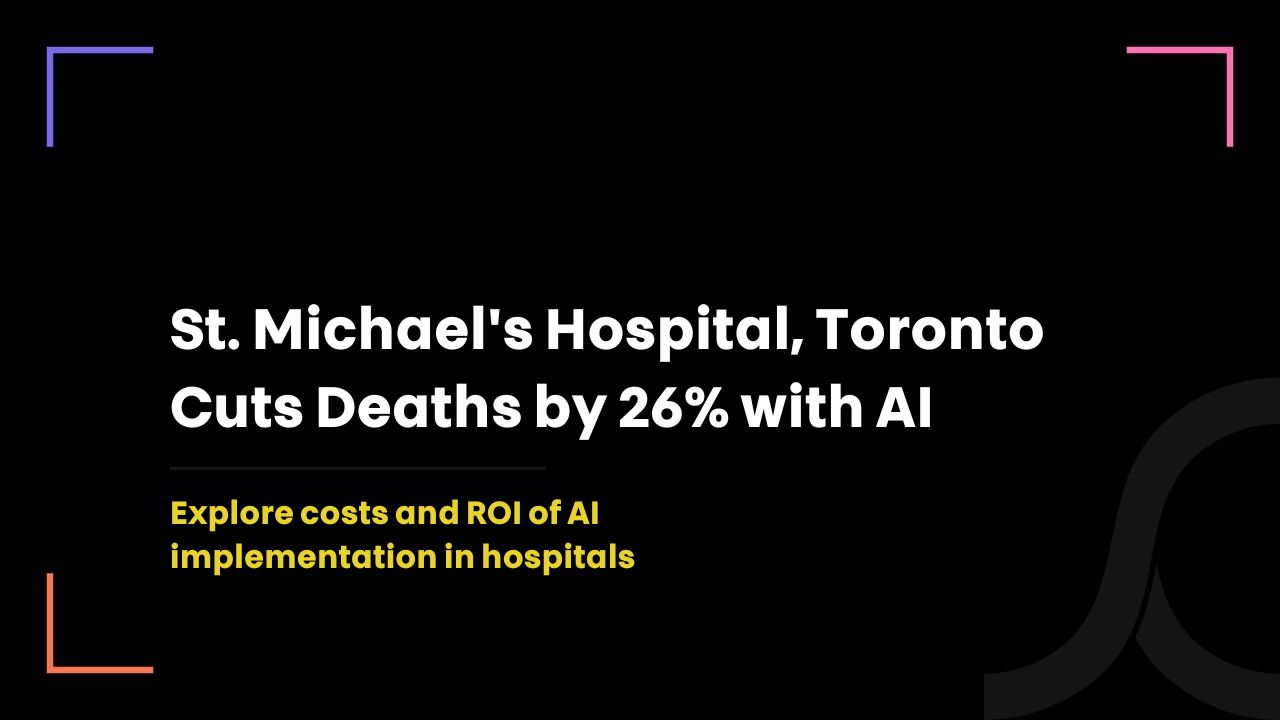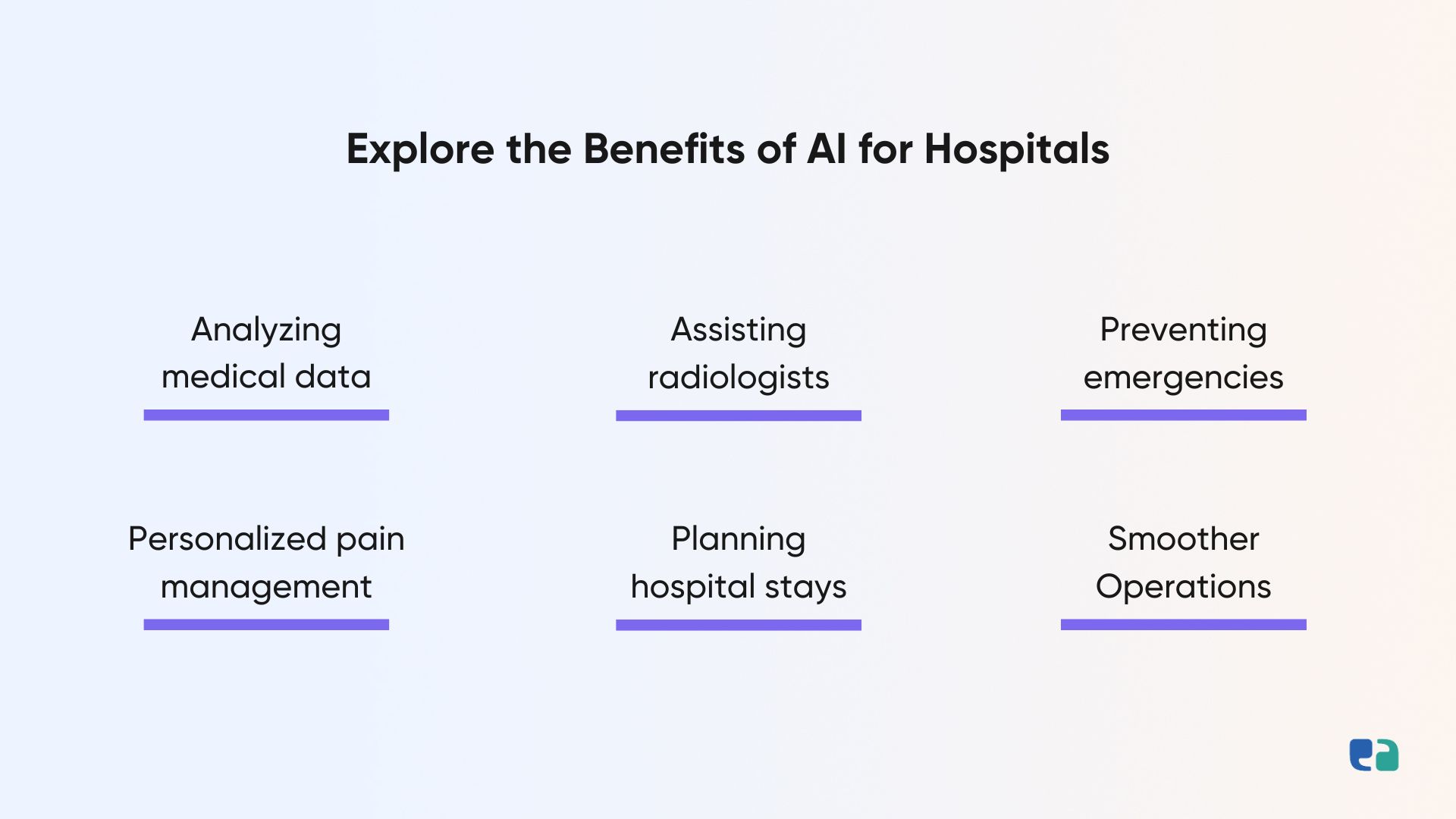How to Implement AI in Hospitals: Applications, Costs, and ROI

10 months ago
First ChatGPT, then Gemini, and now DeepSeek, seems like the race for AI is not going to stop.
But why should it if it can bring revolutionary challenges to human life?
It's transforming different processes around the world—especially the healthcare system.
No one can deny how slow Canadian healthcare has become. All credit goes to rising costs, staff shortages, inefficiencies in patient flow, and many more.
The doctors are dedicated, but they can't rely on old methods of practice.
Even after so many changes and updates in management, hospital length of stay remains 2% higher than in 2020 and now even more.
Delayed diagnoses or missed patient deterioration signals are impacting lives.
There is a need for machine power to tackle so many challenges.
And what can be better than our hero, Artificial Intelligence (AI)?
And the good part is, even some hospitals have already started to embrace it.
Like Karolinska University Hospital, which optimizes outcomes through AI's predictive analytics.
And not just this, these hospitals are streamlining workflows, improving accuracy, and enhancing transparency.
Let’s Understand the Role of AI in Hospitals & Its Workflow
What we expect from humans, AI is doing now—learning, problem-solving, and decision-making.
These tools are making hospital systems more efficient and cost-effective.
But it's not alone—AI's three branches: machine learning, natural language processing, and robotics, combine together to perform such heroic tasks.
1. Diagnostics: Speed and Accuracy
AI is changing how diseases are detected and diagnosed.
- Medical imaging tools use AI to analyze X-rays, CT scans, and MRIs. These tools help radiologists detect problems quickly and accurately.
Patient data analysis systems, like Chartwatch at St. Michael's Hospital in Toronto, predict patient deterioration. They have reduced unexpected deaths by 26%. Isn't it amazing?
2. Improving Patient Care
AI is improving how hospitals care for patients.
- Personalized treatment plans: AI reviews the patient's medical history and genetic makeup and then creates tailored care plans.
- Real-time monitoring: Some popular AI tools track body vital signs & detect problems early. It monitors atrial fibrillation, a condition linked to strokes.
- AI chatbots: It's like having a doctor at your fingertips. They provide support, answer questions, and schedule appointments.
AI also handles many administrative tasks, including registration and billing. It allows some free time for doctors & staff.
3. Making Administration Smarter
It saves hospitals time & cost. Let's know-how:
- Automates the repetitive tasks like data entry & claims processing.
- Predicts patient needs, like bed management, to save wait time.
- Give an quality accuracy of 90% in their report.
Explore the Benefits of AI for Hospitals

1. Analyzing medical data
AI reviews data, like medical images and lab results, and spots patterns. If it finds something unusual, it indicates it to the provider. At UCLA Medical Center, an AI system identifies cancer cells with over 95% accuracy.
2. Assisting radiologists
- Helps radiologists to interpret X-rays and MRIs.
- Catche subtle abnormalities that human eyes can miss.
3. Preventing emergencies
- Analyzes data to forecast medication needs in real-time.
- Predicts disease or stroke risk.
4. Personalized pain management
AI systems design pain management plans that reduce opioid addiction risks by offering alternative treatments.
5. Planning hospital stays
Due to past data analysis, AI can predict patient stay time. Now, staff has sufficient time to plan the patient's discharge and post-care.
6. Smoother Operations
- Improves scheduling, billing, and resource management.
- Speeds up ambulance dispatches.
- Optimizes bed usage.
- Increases discharge rates.
The NHS Humber Health Partnership uses AI for virtual wards, cutting outpatient visits and unnecessary hospital stays.
How to Implement AI in Your Hospital
Implementing AI in your hospital is a challenging task as it needs tech expertise. Here we are breaking down the entire implementation process, look into it.
1. Understand Your Hospital's Needs
First of all, try to find the struggle of your healthcare organization, where it is lacking. What are its pain points?
For example, hospitals with crowded ERs can use AI-powered triage systems to prioritize patients.
Also, check the hospital budget, its tech infrastructure, and staff's skills.
2. Find the Right AI Tools
There are many AI tools available in the market. Research the options and explore their benefits and limitations.
Talk with the healthcare IT team; they have expertise, and most healthcare IT companies provide free consultations.

3. Decide: Build or Buy
You can get the AI tool on a monthly subscription basis, but the problem is that it won’t perfectly match the needs of your hospital.
You might have to pay a lot to make even small changes.
It would be better if you built your own custom AI solution for your hospital.
The upfront cost will be high, but in the long run, it’s a cost-effective solution.
4. Train Your Team
What will be the point of building an AI solution if no one is using it?
Initially, your staff may show some hesitance toward AI.
But if you provide proper training and educational resources like guides, videos, or a support team, they will show interest.
Create an environment where the staff wants to adopt
Addressing Compliance and Security in Healthcare AI
1. Healthcare Data Privacy Regulations
Following healthcare regulations is very important; otherwise, you will have to pay heavy fines.
The more fines you incur, the more your reputation will be at stake.
Ensure the vendor you're collaborating with has expertise in PIPEDA and HIPAA compliance.

2. Ethical AI and Patient Consent
Transparency is vital in healthcare.
A 2023 survey found that 60% of Americans were uncomfortable with AI making healthcare decisions.
You need to educate the patient and start open communication.
Make sure you take care of the patient. The patient should be aware of the benefits and risks of AI tools that will be used in their treatment.
3. Data Security and Minimizing Bias
- Keep a strong defense against cybercrime and data fraud.
- Ensure encryption, access controls, and regular audits.
- Use diverse databases during model training to avoid any bias.
Hamilton Health Sciences worked on an AI tool to avoid gender bias in cardiac procedures.
Costs and ROI of AI Implementation in Hospitals
If you plan to implement AI in your hospitals, you should understand the costs and the potential return on investment (ROI).
Initial Investments
- Software:
- A SaaS solution requires ongoing subscriptions.
- A custom build has a high upfront cost but offers high ROI and full control.
- Infrastructure: For the implementation of AI, you might need to upgrade the IT system of your hospital as AI needs powerful computing and storage.
- Training: You have to spend money on staff training.
Examples of ROI
Although the initial investment can be high, the ROI can be significant:
- Cost savings: AI can reduce labor costs and improve efficiency. For example, AI can optimize operating room schedules, increase procedure volume, and save money.
- Reduced errors: AI can cut down on human errors. For example, AI tools for medication management can reduce medication mistakes and complications.
- Efficiency gains: AI automates tasks like data entry, letting staff focus on patient care, leading to shorter wait times and better outcomes.
Calculating ROI
You can calculate ROI by considering the following:
- Total costs (software, infrastructure, training)
- Projected benefits (savings, error reductions, efficiency gains)
- Timeframe for realizing benefits
You can compare the costs and benefits and determine whether AI implementation is worth investing.
Overcoming AI Integration Challenges in Hospitals
Integrating AI into your hospital system is very challenging. Let's explore them and see how we can overcome them.
Common Barriers
- Compatibility with Legacy Systems: Most Canadian hospitals use older IT systems (more than 10 years). They might not work well with AI systems. Upgrading these legacy systems is not only expensive, but it can take much of your time.
- Staff Resistance: Humans commonly fear losing jobs due to AI. Due to this, staff may be resistant to it. Concerns about AI giving wrong information can also develop resistance.

Solutions
- Interoperability Tools: An experienced health tech team can suggest some of the best tools to connect old systems with AI. They will make the integration smooth.
- Phased Adoption: Take one step at a time. Start small with AI in one department. Once the staff gets comfortable, you can expand it to other areas.
- Training Programs: You must train your staff about the benefits and risks of AI in your system. For example, the Federation of State Medical Boards educates physicians on using AI responsibly.

Choosing the Right AI Partner
Choosing the right tech partner is essential, even more than choosing the technology itself.
Here's a quick checklist to help evaluate AI vendors:
- Industry Expertise: Make sure the vendor understands healthcare very well. He should have expertise in healthcare regulation and hospital workflow.
- Technology Fit: Can the AI system integrate with your hospital's existing tech? Is it scalable for future growth?
- Data Security and Compliance: Did the vendor's old projects follow HIPAA and other regulations? You can check it by looking at their old work & case studies. Please make sure they are transparent about their security measures.
- Customization: Can the AI solution be tailored to your hospital's needs?
- Support and Training: Your staff will need training to optimize the utilization of technology. Make sure your tech partner provides such support.
- Cost and ROI: Is the pricing transparent, and can the vendor demonstrate a strong return on investment?
By focusing on these factors, hospitals can successfully implement AI to improve patient care and streamline operations.

